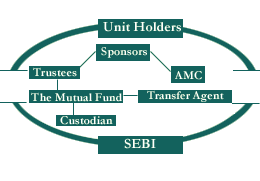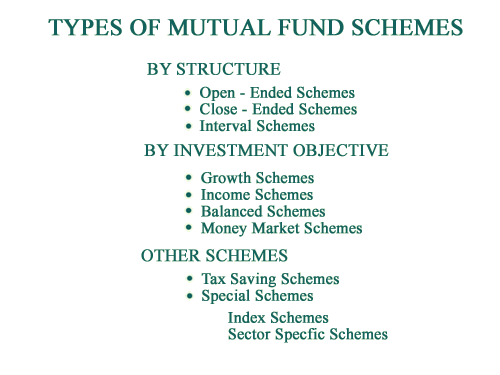|
|
|
ORGANISATION OF A MUTUAL
FUND
|
There are many entities involved and the diagram below illustrates
the organisational set up of a mutual fund:
|

|
|
Organisation of a Mutual Fund
|
|
|
|
Top
|
|
|
|
ADVANTAGES OF MUTUAL FUNDS
|
The advantages of investing in a Mutual Fund are:
Professional Management
Diversification
Convenient Administration
Return Potential
Low Costs
Liquidity
Transparency
Flexibility
Choice of schemes
Tax benefits
Well regulated
|
|
|
|
Top
|
|
|
|
TYPES OF MUTUAL FUND SCHEMES
|
Wide variety of Mutual Fund Schemes exist to cater to the needs
such as financial position, risk tolerance and return expectations etc. The table
below gives an overview into the existing types of schemes in the Industry.
|

|
|
Top
|
|
|
|
FREQUENTLY USED TERMS
|
|
|
Net Asset Value (NAV)
|
Net Asset Value is the market value of the assets of the scheme
minus its liabilities. The per unit NAV is the net asset value of the scheme divided
by the number of units outstanding on the Valuation Date.
|
|
|
Sale Price
|
Is the price you pay when you invest in a scheme. Also called
Offer Price. It may include a sales load.
|
|
|
Repurchase Price
|
|
Is the price at which a close-ended scheme repurchases its
units and it may include a back-end load. This is also called Bid Price.
|
|
|
Redemption Price
|
|
Is the price at which open-ended schemes repurchase their units
and close-ended schemes redeem their units on maturity. Such prices are NAV related.
|
|
|
Sales Load
|
|
Is a charge collected by a scheme when it sells the units.
Also called, ‘Front-end’ load. Schemes that do not charge a load are called
‘No Load’ schemes.
|
|
|
Repurchase or ‘Back-end’Load
|
|
Is a charge collected by a scheme when it buys back the units
from the unitholders.
|
|
|
|
Top
|